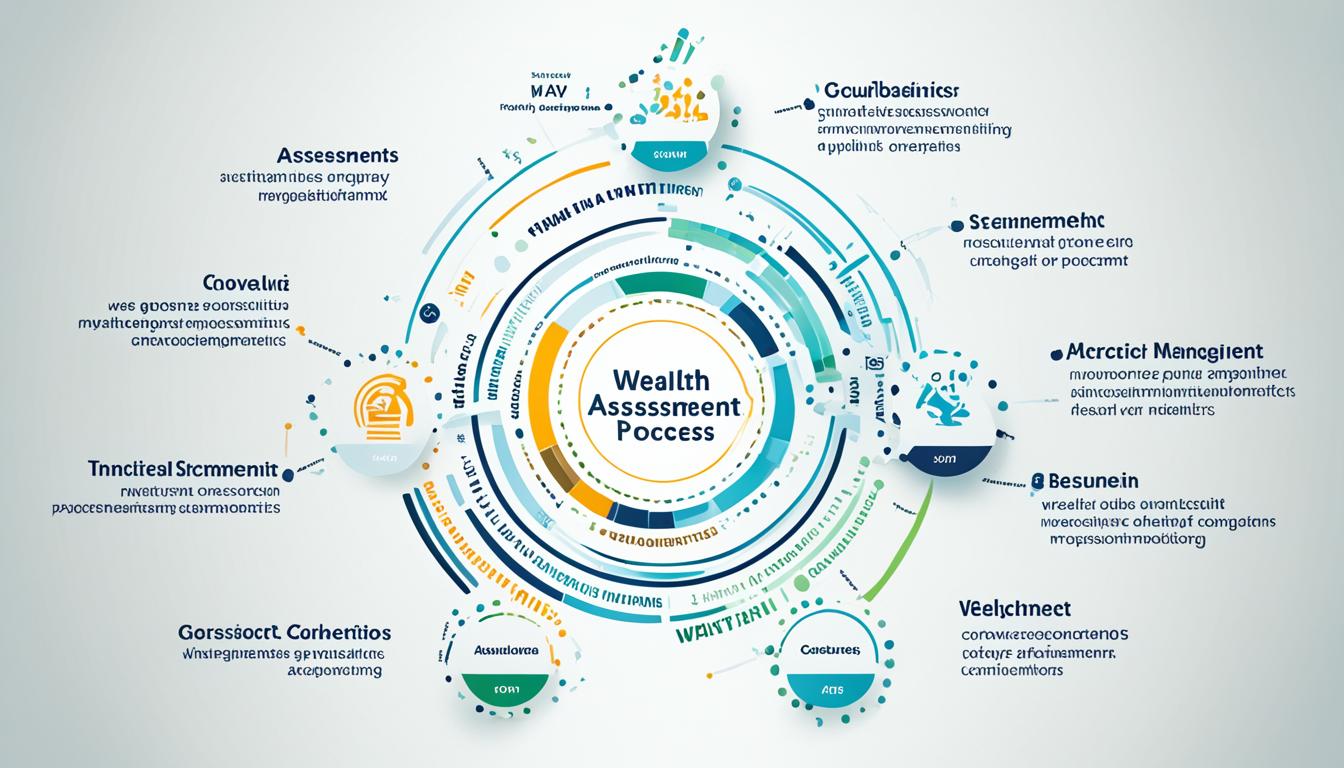Valuing a wealth management firm is crucial for making informed financial decisions. By understanding the worth of a firm, businesses can optimize their strategies and ensure optimal financial decision-making. Let’s explore the how to value a wealth management firm and the various wealth management firm valuation methods used to assess their value.
Key Takeaways:
- Valuing a wealth management firm involves assessing assets, cash flow, client base, and profitability.
- Key components of valuing a wealth management firm include assets under management, client retention rates, revenue growth, profitability, and reputation.
- Factors affecting the value of a wealth management firm include the client base, advisor expertise, revenue streams, growth prospects, technology infrastructure, and compliance.
- Best practices for valuing a wealth management firm include due diligence, financial analysis, evaluating performance and growth potential, and benchmarking against peers.
- Mastering the art of valuing a wealth management firm enables businesses to make informed financial decisions and thrive in the dynamic financial landscape.
Key Components of Valuing a Wealth Management Firm
When valuing a wealth management firm, there are several key components that must be considered. These components play a crucial role in determining the worth of a company in the industry. By evaluating these factors, businesses can gain insights into the firm’s potential for growth and profitability. Let’s take a closer look at these key components:
- Assets under management: Assessing the value of a wealth management firm involves analyzing the total assets under its management. This includes determining the types of assets held and their current market value. The higher the value of assets under management, the more valuable the firm may be considered.
- Client retention rates: The ability of a wealth management firm to retain its clients is an essential factor in determining its worth. Higher client retention rates indicate that the firm has built strong relationships and trust with its clients, contributing to its long-term profitability and sustainability.
- Revenue growth: The growth rate of a wealth management firm’s revenue is a significant indicator of its overall performance. Higher revenue growth reflects the firm’s ability to attract new clients, increase assets under management, and generate more income.
- Profitability: The profitability of a wealth management firm is an essential consideration in valuing the company. It involves assessing its profit margins, return on investments, and overall financial performance. A profitable firm is generally viewed as more valuable.
- Reputation and client satisfaction: The reputation and client satisfaction of a wealth management firm are crucial to its value. A firm with a strong reputation for providing exceptional service and meeting clients’ needs is likely to have a higher value. Positive testimonials and referrals also contribute to the firm’s reputation and client satisfaction.
When determining the worth of a wealth management firm, various valuation techniques are commonly employed. These techniques include discounted cash flow (DCF) analysis, market multiples, and the net asset value (NAV) method. These methods provide a comprehensive assessment of the firm’s value by considering the present value of expected future cash flows and the time value of money. By utilizing these valuation techniques alongside evaluating the key components mentioned above, a more accurate estimate of the firm’s worth can be derived.
“Valuing a wealth management firm requires a deep understanding of its key components and the application of appropriate valuation techniques. By assessing assets under management, client retention rates, revenue growth, profitability, and reputation, businesses can gain valuable insights into the firm’s true worth.” – Wealth Management Expert
It is important to note that the valuation of a wealth management firm is a complex process that requires expertise and careful analysis. Engaging the services of a professional valuation expert can provide valuable insights and ensure an objective assessment of the firm’s value. By considering these key components and utilizing appropriate valuation techniques, businesses can make informed financial decisions and optimize their strategies for long-term success in the wealth management industry.
Factors Affecting the Value of a Wealth Management Firm
Several factors can impact the value of a wealth management firm. These include the firm’s client base and the relationships it has with its clients, the expertise and reputation of its advisors, the diversity and stability of its revenue streams, and the competitive landscape.
Additionally, the firm’s growth prospects, the quality and effectiveness of its technology infrastructure, and its compliance with industry regulations can also affect its value. Pricing strategies, including fee structures and performance-based fees, are crucial considerations when assessing the value of a wealth management firm.

Best Practices for Valuing a Wealth Management Firm
Accurately valuing a wealth management firm requires following best practices to ensure a comprehensive assessment. By adopting these practices, businesses can make informed financial decisions and optimize their strategies. Here are some essential steps to consider:
Conduct Extensive Due Diligence
Due diligence is crucial when valuing a wealth management firm. It involves gathering and analyzing relevant data and information to gain a comprehensive understanding of the firm’s operations, financials, and market position. Conducting thorough due diligence helps uncover critical insights that contribute to an accurate valuation.
Analyze Financial Statements and Metrics
Examining the firm’s financial statements is a significant step in the valuation process. It involves assessing key metrics such as return on assets (ROA) and return on equity (ROE) to evaluate the firm’s financial performance and profitability. Analyzing financial statements helps gauge the firm’s stability and growth potential.
Evaluate Past Performance and Growth Potential
Assessing a wealth management firm’s past performance provides valuable insights into its track record and ability to generate consistent returns. Evaluating growth potential involves analyzing factors such as the firm’s market opportunities, client acquisition strategies, and expansion plans to forecast future performance.
Assess Competitive Advantage and Market Position
Understanding a firm’s competitive advantage and market position is essential for accurate valuation. Identifying unique selling propositions, differentiated service offerings, and strong client relationships helps determine the firm’s market advantage. Assessing the firm’s position relative to its competitors adds valuable context to the valuation process.
Consider Industry Trends and Peer Benchmarking
Keeping abreast of industry trends and market dynamics is crucial when valuing a wealth management firm. Recognizing emerging opportunities and potential risks helps estimate the firm’s future performance. Benchmarking the firm against its peers enables a comparison of its strengths, weaknesses, and market position.
Engage Professional Valuation Experts
Engaging the services of professional valuation experts can provide an objective assessment of a wealth management firm’s value. These experts possess the necessary expertise, experience, and knowledge to thoroughly evaluate the firm’s financials, operations, and market position. Their insights add credibility and accuracy to the valuation process.
By following these best practices, businesses can ensure a comprehensive and accurate valuation of a wealth management firm. Implementing thorough due diligence, analyzing financial statements, evaluating growth potential, assessing competitive advantage, considering industry trends, and engaging professional valuation experts contribute to optimal financial decision-making.

Conclusion
Valuing a wealth management firm is a complex process that requires a thorough assessment of various factors and the application of different valuation techniques. By understanding the true value of a firm, businesses can make informed financial decisions that will position them for long-term success in the dynamic financial landscape.
Key components such as assets under management, client retention rates, revenue growth, profitability, and client satisfaction play a vital role in determining the worth of a wealth management firm. Additionally, factors like the firm’s reputation, technological infrastructure, compliance with regulations, and pricing strategies are crucial considerations in the valuation process.
Best practices for valuing a wealth management firm involve conducting in-depth due diligence, analyzing financial statements and metrics, evaluating past performance and growth potential, and benchmarking against industry peers. Engaging the expertise of professional valuation experts can provide invaluable insights and ensure an objective assessment of the firm’s value.
By mastering the art of valuing a wealth management firm, businesses can make optimal financial decisions and navigate the ever-changing financial landscape with confidence. With a comprehensive understanding of the firm’s value, they can strategically position themselves for long-term prosperity.
